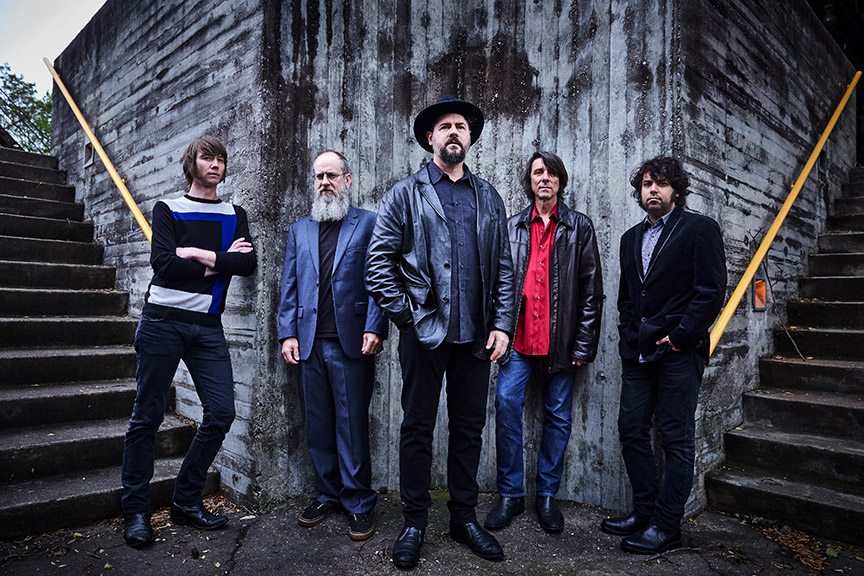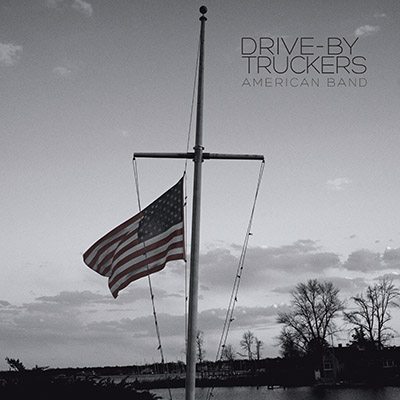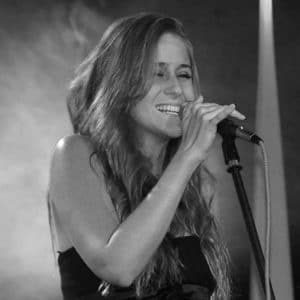
“He was running down the street when they shot him in his tracks/ about the only thing agreed upon was that he ain’t comin back.” Patterson Hood opens up “What It Means” with that solemnly honest line from The Drive-By Truckers’ powerful, controversial new album, “American Band.” That sort of lyric fits with the types of stories Hood and his brother-in-arms Mike Cooley have been telling over the course of the band’s 20-year career — tales of “greed, fixed elections, guns and drugs and whores and booze,” as Cooley eloquently put it on 2004’s “Cottonseed.”
But the stories on “American Band” are different than what Cooley and Hood have ever told. They are stories that are playing out on TV in real time, stories that are streaming right to your phone as they happen, stories that have not yet ended. The album is a startling and, in parts, damning observation of America and the tumultuous ways race, guns and politics have bled into the current national discourse. It’s a significant tack for a band that has mainly dealt with the mythology of the South and how the sins of the forefathers are bestowed upon their children, with colorful characters weaving fictions and truths into one tall tale.
 For the most part, the characters that appear on this album are real people who have tragically met their end from an unjust world. Hood’s “What It Means” is a testimonial of the deaths of Eric Garner, Michael Brown and Trayvon Martin. “Guns Of Umpqua” details the shooting at Umpqua Community College in Oregon and the serenity of life right before its end. “Ramon Casiano” retells the shooting death of 15-year Ramon Casiano at the hands of future NRA leader Harlon Carter on the Mexican border in 1931. It’s not pretty stuff but the Truckers want to make sure you acknowledge what is going on.
For the most part, the characters that appear on this album are real people who have tragically met their end from an unjust world. Hood’s “What It Means” is a testimonial of the deaths of Eric Garner, Michael Brown and Trayvon Martin. “Guns Of Umpqua” details the shooting at Umpqua Community College in Oregon and the serenity of life right before its end. “Ramon Casiano” retells the shooting death of 15-year Ramon Casiano at the hands of future NRA leader Harlon Carter on the Mexican border in 1931. It’s not pretty stuff but the Truckers want to make sure you acknowledge what is going on.
In this way, “American Band” feels very much like a documentary of what the world is like through the eyes of Hood and Cooley. In a conversation with Tahoe Onstage about the album, Hood confirmed as much and hoped that “American Band” was as much a snapshot as it was a statement. A statement that a bunch of middle-aged white guys from the deep South without college educations believe in Black Lives Matter, that right-wing nuts and Bible-thumping politicians don’t speak for them, that they don’t beckon for the glory days of a divisive and racist past. “American Band” is a powerful album from a band that produces some of the most engrossing music of its generation.
I had been given “American Band” to listen to just before I went off to Costa Rica for vacation. I couldn’t even get through the album while I was there. Sitting on beach in the Caribbean, I couldn’t connect with the music. The stories and issues on the album feel too rooted in American identity, too entrenched in the current climate of the culture. I couldn’t give it a full listen until I was back on Uncle Sam’s soil.
As I waited through the airport in Costa Rica to start my journey home, CNN was displaying the images of protests that had erupted in Charlotte after the killing of Keith Lamont Scott, another black man who died at the hands of police officers under muddled circumstances. It was numbingly familiar. I talked to Hood six days later on Sept. 28, enough time for another police shooting to transpire, this time in San Diego, and a school shooting to take place in South Carolina the day we talked. “American Band” and the The Drive-By Truckers couldn’t be any more relevant than right now.
The Drive-By Truckers and Lydia Loveless play MontBleu Resort Casino and Spa on Saturday, Oct. 8.
The following interview has been edited for clarity and length.
Tahoe Onstage: “American Band” is an observation on your part and Cooley’s and the band’s about what has been going on in America for the past two years or so. When did you guys start writing the songs that were going to be on this album?
Patterson Hood: The first song I wrote was “What It Means,” I wrote it over two years ago, in the fall of 2014. It was right in the wake of Trayvon Martin and the Ferguson decision. It was stuff I’ve been thinking about a long time, you know cause it’s not a new thing, but it’s been talked about more and more. There was an incident referred to in the song, there is a line about Root Street, which is a street that I used to live on in Athens, Georgia. It happened 21 years ago and was very comparable to what’s been happening this week and last week and over and over and over. So it’s been kind of an ongoing thing and I have thought about it a lot over the years. But at that moment in time when things were really heating up in Ferguson and there is all the protests and the beginning of the Black Lives Matter movement and all of that. I said, “how have we not gotten passed this already? Can we not get passed this as a people you, know?” We’re literally walking onto comets (laughs). We’re studying black holes and studying colliders and all kinds of amazing things mankind can accomplish, can we not get past the simple fear of the other that is leading us to such a dark place in our cities and town and culture? I didn’t think of it as much as an angry protest song as much as a questioning and maybe the beginning of a conversation, a better conversation.
Tahoe Onstage: It’s important to mention, as you note, that this isn’t anything new, that this has been happening since the dawn of man.
Hood: Yeah, I mean the album that first made our band kinda famous was “Southern Rock Opera,” which has been out for 15 years now and the songs on the album were written 20 years (ago). The basic questions that album was about was about growing up in the post-Civil Rights South and the legacy of George Wallace and Bill Connor and the decisions like that made in the ’60s and ’70s and how it affected what we did and how it affected people who looked at us and where we were from. I think right now we are in a very parallel time with that, where all these years later it’s not Alabama but the whole country right now. It’s frightening to me because I’ve seen where it can lead and I would hate to see that.
I’ve had troubles in my life but I’ve never had to worry about getting shot if my car breaks down on the side of the road, at least not by the people who were hired to protect us if our car breaks down on the side of the road. I’ve never had to think about that. There are conversations that I’ve never had to have with my children growing up that our bass player, who has a black daughter, will have to have with his child. As long as that’s the case there is a lot of unfinished business we have to do.
Tahoe Onstage: I’m interested, over these past two years, did you have to shelve any ideas? There is a certain theme to this album.
Hood: There is definitely some things that I’ve written over the past couple years that I imagine I’ll double back to. There is one song in particular that didn’t fit on this album that I want to use again in another project or find something good to do with. I felt strong about it and it fit thematically with the record but we wanted to keep it pretty tight and pretty concise.
We were really committed to keeping this record under 44 minutes so we could fit it on two vinyls but we didn’t quite make it. It comes with a 45 (rpm) , so we were about three minutes over (Laughs). That is one of the things that I love about vinyl, it has these parameters you need to work with. We were definitely applying the discipline to ourselves to fit this one thing and we didn’t quite make it, but I am happy about it.
I love The Clash. They were a touchstone in the making of this record. We don’t sound anything like The Clash, but we love them and the approach they took. If you think about “Rock The Kasbah,” it was a completely great as a danceable pop song of its time, but it’s also political. The message it had in 1982 is just as relevant in 2016. It works on all these levels and we were thinking about that. We wanted this to be a fun record, a rock record. It’s a fun rock show that we are out playing behind this record because that is important. “Rock The Casbah” is a fun song. There are times where this record are pretty heavy and dark, but at the same time there is a joyousness in all of it. I hope that there is a hope in it it. I don’t consider myself a pessimist, but a little bit of an optimist, a pragmatic optimist (Laughs).
Tahoe Onstage: One song that comes to mind when you think of fun on the record is “Kinky Hypocrite,” which if I were to start a DBT cover band, that would have to be the name. That song is really fun, top three on the album.
Hood: (Laughs) I’m quite fond of that song too. When the record ran over Cooley suggested taking that song off the record so it would fit and we all kind of fought for it. We really fought for, hence the compromise that it is the 45 that comes with the record.
Tahoe Onstage: I wanted to talk about the album title, “American Band.” Why did you feel you had to proclaim, by way of the title, that you were an American band?
Hood: There were all these people who like to claim ownership of being American. A lot of times you see the right-wingers, “America! America first!” That kind of talk where I have an idea of what America is and if you don’t conform to that you aren’t a good American. So it’s kind of our response to that a little bit. I am middle-aged, white southerner, from Alabama, who was a college dropout. I am the kind of the classic Donald Trump demographic, but he doesn’t speak for me and the ideas he claims to stand for aren’t mine. I’m every bit of American as he is or whoever. That figured into the album name a little bit.
Tahoe Onstage: This is also the first album you’ve had without any artwork. Wes Freed has obviously been your artist for a long time now but you didn’t go that route. What was behind that decision?
Hood: We wanted the record to stand apart and be kind of its own thing. We kind of decided early on that we wanted it to have a kind of a photojournalism feel to it, to the artwork. It’s a very simple, black-and-white image that carries a lot of meaning to it. As Cooley pointed out, it felt like during the time we were making this record that anytime you saw a flag it would be at half-mast. I can almost forget what it looks like to be at the top of the pole where it should be cause there have been so much turmoil and killings and shootings and awful things that are happening in our post-9/11 world right now. So it’s a little bit of a statement on that, too.
Tahoe Onstage: One song I wanted to talk to you about was “Baggage.” That song really made me think about what everyone is carrying around for themselves, their own personal baggage. Where were personally in the moment that “Baggage” came around?
Hood: I’ve had my own bouts with depression and actually don’t know many people that don’t. Most of the people I know have at gone through a little bit of that at least once in their lives. I’ve lost a lot of friends that weren’t able to deal with it. I wrote that song the night Robin Williams died. Here is somebody whose life’s work was to make people forget their troubles and lives and in the end he wasn’t able to survive it, he took his own life. It is so sad to me but it is also scary. As someone who has dealt with my own issues at various times and have found a way to get through them, I am blessed to this point. It’s sobering to think about that.
Almost all of these songs were written fast after a long process to think about the things that are on it. I’ve probably thought about the stuff on that song for 20 years and tried to talk about some of that stuff on the last album. I was working my way through a particular down time in my head when we were making English Oceans, but I wasn’t maybe able to articulate it or put it into words. But the night I wrote “Baggage” it just exploded out of me. The same for “What It Means.” I had contemplated writing a song about the gun violence stuff for a long time but never knew quite how to write about it or address it, but “Guns of Umpqua” kind of wrote itself. I think the same is for Cooley on this record as well.
Right before you called I was reading Bruce Springsteen’s book that just came out. Here’s a guy who’s got… what an idyllic thing. Has been a consummate artist who has been able to function at or near the top of his game for decades. Millions of adoring fans and a healthy family that loves him. Everything that in America we are told to subscribe to, and yet a big part of this book is his depression and his bout with depression and self-doubt. Its the baggage from his childhood. The very things that have prepared him for an artist to write such great songs almost pulled him under. You know, if Bruce is having such a hard time, what do I do? (Laughs)
Tahoe Onstage: I wanted to ask one more thing before you go. Do you have a vision of what you want to be doing as an artist over the next couple years? Do you have a bucket list of what you want to do?
Hood: I mean right now the band is riding a 20-year high. We’re in a better place as a band then we’ve ever been. I’m excited to see what we’re going to be able to do next, whatever reveals itself as the next chapter we are going to go in. We’ve been through trauma and personnel changes and every imaginable down thing you could think of for a history of a band. But we’re coming up on five years with this current lineup and it’s really stable and a force and is only getting better everyday. It’s kind of the magic lineup after all these years. I am happy where I’m at right now as writer and my playing is still improving. I don’t know what’s next, we are going to be touring behind this record for the next year-and-a-half. I’d love to do another side-project. We did a record with Booker T. Jones, I’d like to work with him again. We did that record backing up Betty LaVette and I’d like to do another similar project like that, where we are doing something that isn’t quite a Drive-By Truckers record. Maybe do some other types of writing as well, we’ll just have to see.
– Garrett Bethmann
Related stories:
-Emotionally charged Drive-By Truckers show at Lake Tahoe. LINK
-“American Band” album review LINK


One Response
Love your work!